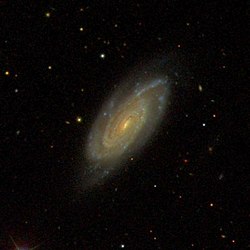NGC 5875
| NGC 5875 | |
|---|---|
 The spiral galaxy NGC 5875. | |
| Observation data (J2000 epoch) | |
| Constellation | Boötes |
| Right ascension | 15h 09m 13.16s[1] |
| Declination | +52° 31′ 42.4″[1] |
| Redshift | 0.011695 [1] |
| Heliocentric radial velocity | 3506 ± 2 km/s[1] |
| Distance | 172.4 ± 12.1 Mly (52.87 ± 3.70 Mpc)[1] |
| Apparent magnitude (V) | 12.4[1] |
| Characteristics | |
| Type | SAb?[1] |
| Size | ~116,800 ly (35.80 kpc) (estimated)[1] |
| Apparent size (V) | 2.3' x 1.2'[1] |
| Other designations | |
| IRAS 15077+5243, 2MASX J15091320+5231418, UGC 9745, MCG +09-25-027, PGC 54095, CGCG 274-027[1] | |
NGC 5875 is a spiral galaxy in the constellation of Boötes. Its velocity with respect to the cosmic microwave background is 3585 ± 6 km/s, which corresponds to a Hubble distance of 52.87 ± 3.70 Mpc (∼173 million light-years).[1] It was discovered by German-British astronomer William Herschel on 1 May 1788.[2]
The SIMBAD database lists NGC 5875 as a Seyfert II Galaxy, i.e. it has a quasar-like nuclei with very high surface brightnesses whose spectra reveal strong, high-ionisation emission lines, but unlike quasars, the host galaxy is clearly detectable.[3]
Two supernovae have been observed in NGC 5875: SN 2022oqm (type Ic-pec, mag 17.3)[4] and SN 2023ldh (type IIn, mag 20.7).[5] SN 2022oqm has been described as one of the brightest CaRTs (Calcium-rich Transients) known.[6]
See also
[edit]References
[edit]- ^ a b c d e f g h i j k "NASA/IPAC Extragalactic Database". Results for NGC 5875. Retrieved 7 August 2024.
- ^ Celestial Atlas entry for NGC 5875. Retrieved 7 August 2024.
- ^ SIMBAD database entry for NGC 5875. Retrieved 7 August 2024.
- ^ Transient Name Server entry for SN 2022oqm. Retrieved 7 August 2024.
- ^ Transient Name Server entry for SN 2023ldh. Retrieved 7 August 2024.
- ^ SN 2022oqm: A Bright and Multi-peaked Calcium-rich Transient. By S. Karthik Yadavalli et al. Retrieved 7 August 2024.
External links
[edit] Media related to NGC 5875 at Wikimedia Commons
Media related to NGC 5875 at Wikimedia Commons- NGC 5875 on WikiSky: DSS2, SDSS, GALEX, IRAS, Hydrogen α, X-Ray, Astrophoto, Sky Map, Articles and images
